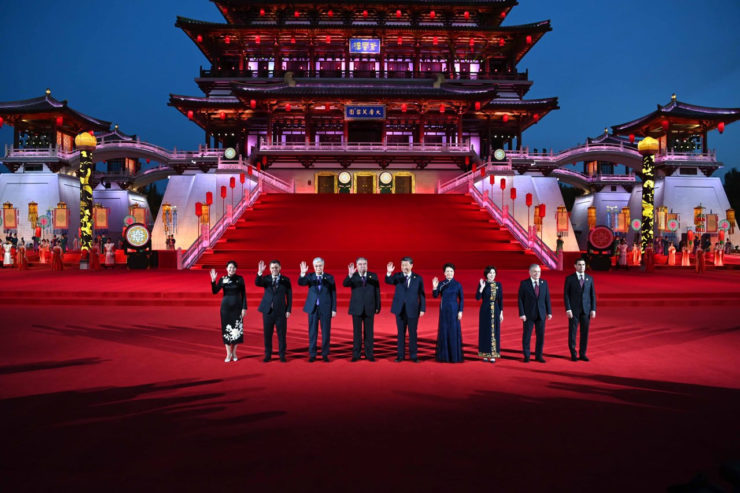
The China-Central Summit held last month attracted a lot of international attention. In the West, the summit was seen as a major step towards Chinese consolidation in the otherwise resource-rich region historically dominated by Russia. More specifically, the Western mainstream media, or Western political pundits, saw the summit as Beijing’s bid to fill the so-called ‘void’ created by Russia’s preoccupation with Ukraine. The argument presented to the Western audience says that China is “replacing” Russia in Central Asia. Thus, the China-Russia alliance also becomes full of tensions and divergences. As a result, the China-Russia alliance poses no real threat to the West and its hegemony of the global political economy. A recent article in the United States Institute of Peace – which is a state-created, federal think-tank based in Washington – said that China is seeking to “fill a void” in Central Asia in the absence of Russia. Other US-based political pundits see China’s increasing engagement with Central Asia as a new “threat” to Russia, with China seeking “to displace Russia in its former empire”.
In another world, where Russia and China were enemies and rivals, such an analysis would have been accurate. Thankfully, we do not live in such a world, nor does such a world exist in a way many in the West seem to believe and comfort their anxieties with.
Therefore, most of the analysis coming out of this anxious Western world reads more like propaganda than a realistic analysis. To begin with, none of these analyses takes into account how the US itself, believing that it can exploit Russia’s pre-occupation with Ukraine, has recently started to actively get involved in Central Asia. This recent involvement is most evident in Antony Blinken’s “new” approach in Central Asia. While there is nothing “new” about this approach, the fact that Blinken visited Central Asia early this year (February 2023) makes it a poignantly timed visit. The only purpose of Blinken’s visit was to reactivate the US politics of interference in the region – a policy that comes in the disguise of advocating the “independence” of the Central Asian states from Russian influence.
A recent report in the United States Institute of Peace said, Central Asia is a region “surrounded by countries under international sanctions”. Therefore, the US is a country that can “help support increased economic integration and connectivity through the Caucasus, the Caspian Sea and Turkey, and support sanctions relief where possible for Central Asian countries.” The US, therefore, is a country that can help the Central Asian states not only get integrated with the Washington-dominated global system but that this integration will be made possible via the application of coercive economic and financial policies (e.g., sanctions) against certain countries (e.g., Russia and China).
For Russia – and even China – a US presence in the region is undesirable and threatening, as the US agenda of helping Central Asia states to get “independence” is only a different name for creating political instability in the region. An unstable Central Asia means that Russia and China will remain primarily preoccupied with managing their backyards instead of focusing on their collective agenda of creating a new, alternative world order – an order that does not include the US as its hegemon but has many power centres.
This is the broader context against which one must understand the real significance of the China-Central Asia summit. More than China undercutting Russia in Central Asia, the summit reinforces the China-Russia unlimited friendship insofar as the summit seeks to deepen China’s engagement with the region, not to displace Russia but to prevent their common backyard from extra-regional influences and trouble-makers. In this context, even though China’s role will deepen in Central Asia, there is no reason to conclude that this depth comes at the expense of Russia. In fact, quite the contrary. If there is any power that gets negatively affected by this deepening of the ties, it is the US. Just as China’s fast-growing ties with the Middle Eastern states have pushed the US out of the region, China’s economic presence in the region is supposed to act as a shield against Washington’s nefarious, interventionist designs. In this context, it is not China seeking to “displace” Russia; rather China and Russia are coming together to protect the region from the US. This is where the true novelty — and the actual geopolitical significance – of the China-Central Asia summit lies.
In fact, capturing Blinken’s “new” approach and the agenda behind this approach, the summit declaration said that China and Central Asian states,
“are unanimous that ensuring state security, political stability and constitutional order is of key importance, and resolutely oppose attempts to discredit legitimate state power and provoke “color revolutions”, as well as interference in the internal affairs of other countries in any of its forms and under any pretext.”
Nowhere does the declaration target any regional, i.e., Russian, influence on Central Asia as a problem. Given the focus of the summit – especially, when one contrasts it with some of the stories published in the Western media – it becomes obvious that the China-Central Asia Summit, with its underlying logic of greater regional integration, is only a step towards further, meaningful consolidation of a multipolar world.
For the US, such consolidation is not a good sign. In fact, the more such integration happens, the less the US will be able to insert its agenda in Asia and shape its politics in a way that is advantageous for its hegemonic interests. But the reshaping of Central Asia as a region much more closely tied to the politics of a new world order explains why we have so much negative analysis flooding the international media.
Salman Rafi Sheikh, research-analyst of International Relations and Pakistan’s foreign and domestic affairs, exclusively for the online magazine “New Eastern Outlook.“